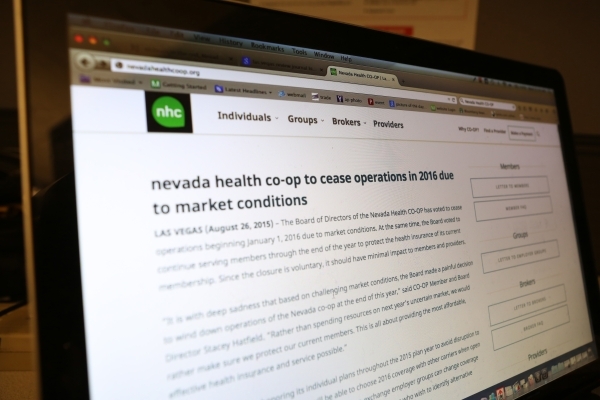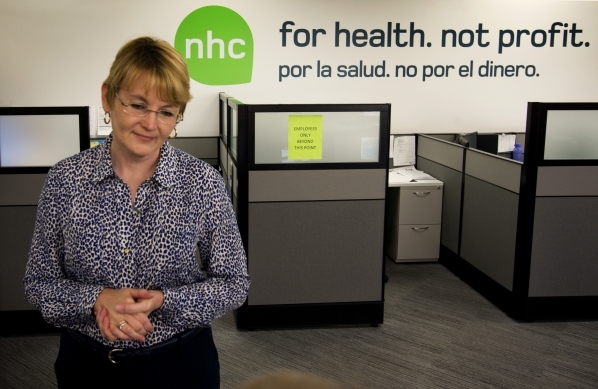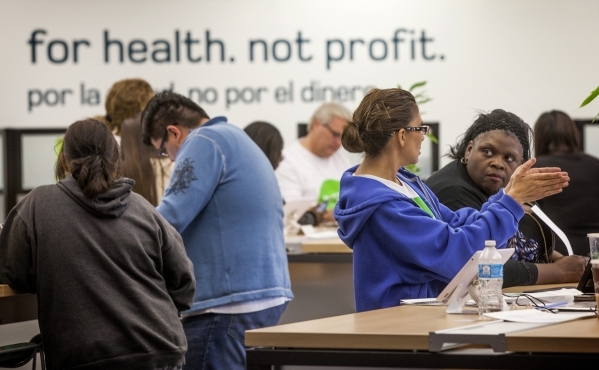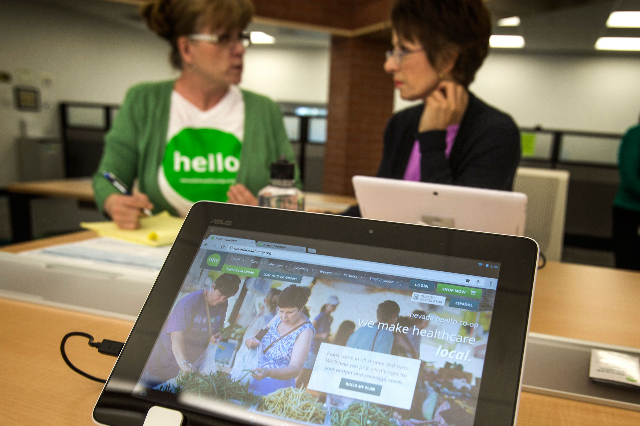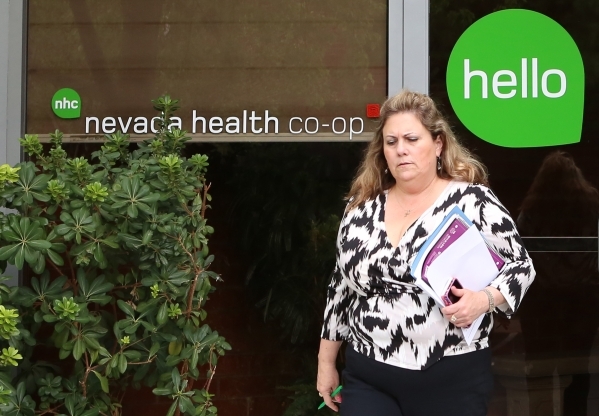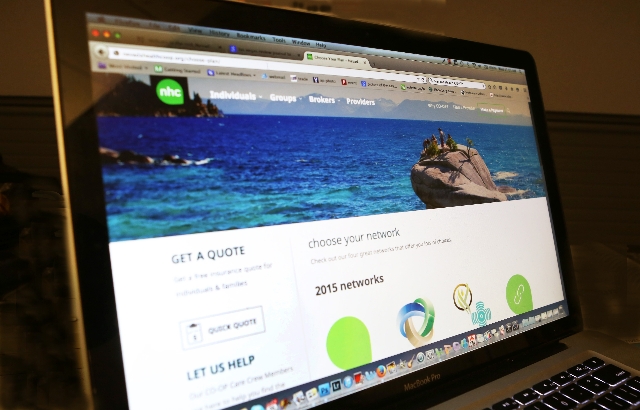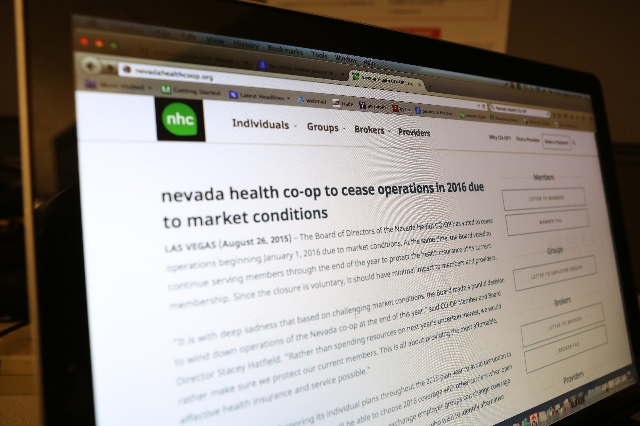Millions in the red, a Nevada Obamacare insurer has failed
Nevada's health insurance exchange is losing its only locally based carrier.
Nevada Health CO-OP, a nonprofit insurer created by the Affordable Care Act and federally funded to offer health coverage through the Nevada Health Link marketplace, said Wednesday that it cannot make enough money to stay in business after Jan. 1.
Co-op CEO Pam Egan said a second year of high claims costs and limited growth projections for enrollment made it "clear" the insurer would have a hard time providing "quality care at reasonable rates" in 2016.
"(Nevada Health CO-OP) is working responsibly and proactively with the Nevada Division of Insurance and the Centers for Medicare and Medicaid Services to ensure that we meet all deadlines and fulfill obligations to our current members," Egan said.
The nonprofit said members' policies will stay in effect through Dec. 31, and it is committed to fulfilling obligations to enrollees. It also said it will continue paying broker commissions.
Amid reports that the Affordable Care Act has slashed the nation's share of uninsured from more than 17 percent to less than 12 percent, the co-op's fate is a reminder that some components of the law don't work as intended.
Observers say the co-op, as idealistic as its origins were, could not survive market realities amid early troubles with doctor networks, reimbursements, off-exchange coverage and administrative costs. The co-op's failure is something of a blow to the state's competitive landscape, and it's unclear if it can repay $65.9 million in federal loans it received for its 2012 launch.
EARLY CONCERNS
Obamacare included member-run, locally based nonprofit insurers to increase competition for existing carriers. The idea initially worked: Nevada Health CO-OP had more than a third of the market in the 2013 enrollment period, beating out big, publicly traded competitors UnitedHealth Group and Anthem Blue Cross and Blue Shield.
But the market balanced out in 2014 and 2015, and the co-op slipped out of the top spot. Recent financial statements show it struggling to make money.
The nonprofit reported a $19.3 million operating loss in 2014, and a $3.5 million first-quarter loss through March, according to Centers for Medicare and Medicaid Services records. From January through June, it lost $22.7 million.
Some local insurance brokers said they had reservations early on about the co-op.
Pat Casale, managing partner of The MultiCare Group in Las Vegas, said he sold few co-op plans because he "wanted to kick the tires and make sure the vehicle drove well." He said his clients gravitated toward established, multibillion-dollar insurers as a safer bet.
Frank Nolimal of Assurance Ltd. said he mostly steered clear of the co-op.
"When I started seeing the problems they were having, I did not want to see my customers nor myself get into harm's way and have that disruption of business," he said.
Those problems included major mixups in provider networks.
Within weeks of the exchange's October 2013 launch, buyers of co-op coverage reported that doctors said to be in the insurer's network disputed having care contracts and refused to see them.
The co-op also had trouble paying specialists.
Southern Nevada's largest oncology practice, Comprehensive Cancer Centers of Nevada, left the co-op's network in July 2014, saying reimbursements took as long as three months. The industry norm is one month.
Plus, the co-op made a critical mistake: Only Nevada allows enrollment in non-exchange plans outside of the federal sign-up period, which runs from Nov. 1 to Jan. 31. Most insurers require a 90-day wait to discourage people from going without a plan until they get sick, but the co-op started with no waiting period, then added a 30-day window in late 2014. That created a sicker — and pricier — member pool, Casale said.
"They bought bad business, and that was poor management," he said.
But the co-op's biggest problem may have been its overhead. The U.S Health and Human Services Department's Inspector General pegged the co-op's administrative expense-to-premium ratio at 37 percent — almost double the 20 percent allowed under Obamacare.
Those costs included first CEO Tom Zumtobel's $417,000 annual salary — pay that might be reasonable for a local executive of a Fortune 100 insurer with a $100 billion market cap but is excessive for a small startup nonprofit with no members and less than $70 million in federal loans as its reserve, Casale said.
"They were the most top-heavy company in the marketplace," he said. "When it got out how much money their CEO was making, a lot of people were saying, 'Are you kidding me?'"
Zumtobel is now CEO of Arizona's co-op, Meritus Health Partners, which had an administrative expense-to-premium ratio of 134 percent in 2014, according to the inspector general. Zumtobel told the New York Times earlier this month that the co-op will lose $6.7 million in 2015, but be profitable in 2016.
LOAN REPAYMENT IN DOUBT
The co-op's closure drops Nevada Health Link's Clark County carrier base from five to four, including market giants UnitedHealth and Anthem, which already combine for more than 90 percent of the state's privately insured residents. A third carrier, Prominence, plans to expand from Northern Nevada into Southern Nevada. Humana will also offer two local plans on the exchange for 2016.
Bruce Gilbert, executive director of the exchange, said he doesn't believe the closure will hurt competition.
"We actually have a fairly vibrant marketplace. You can see that from Humana coming in," Gilbert said. "I understand co-ops were meant to provide a competitive balance, but I don't know that they have done that in any of the states in which they're operational. They're all struggling, so it's not about rates or ability to gain market share. Maybe they're just victims of competition in the insurance market."
Gilbert also said the co-op was worth a try, despite its failure.
"Innovation is good. It's not always successful, but it's good," he said. "It's not easy to put together an insurance company under the best of circumstances, but the exchange appreciates the attempt."
That attempt may now cost taxpayers.
The co-op's federal loans — one with a five-year term; the other 15 years — went mostly to the Nevada Division of Insurance to ensure the organization could pay its claims. Profits to repay those loans have yet to materialize.
The state Division of Insurance didn't respond to a request for additional comment by press time Wednesday, so it's unclear if any money will be left after outstanding claims are paid.
Nevada Health CO-OP is the fourth co-op nationally to fail.
Louisiana's Health Cooperative closed in July after suffering a net operating loss of more than $20 million.
Iowa's CoOpportunity Health closed in January, after a sicker-than-average customer base took a financial toll despite $145 million in federal loans.
A co-op in Vermont was shuttered in 2013, before it even began selling plans.
Nevada Health CO-OP may not be the last of it. The inspector general found that 22 of 23 co-ops lost money in 2014, with Maine the exception. The federal government lent $2.4 billion to start co-ops nationwide.
"It is sad to see all of the federal tax dollars that were used to put up this suggested competition for the insurance companies and seeing it fail," Nolimal said. "Co-ops were supposed to keep carriers in line with competition. We threw all of this money at them — millions and, throughout the country, billions of dollars. They failed."
Nevada Health CO-OP started in 2012 as Hospitality Health CO-OP. It was sponsored by the Culinary Union's Culinary Health Fund, its national parent UNITE HERE Health and the Health Services Coalition, a consumer advocacy group with more than 300,000 members employed by cities, unions and big companies.
Unions still play a key role in the co-op: Culinary head D. Taylor and Nevada AFL-CIO executive Danny Thompson were listed as directors in a June 30 financial statement.
Contact Jennifer Robison at jrobison@reviewjournal.com. Follow @_JRobison on Twitter.
RELATED
Officials to be out in droves as deadline looms to buy health insurance under Affordable Care Act
Employees, employers will have more options on insurance coverage starting Oct. 1
Provider network problems in Nevada Health CO-OP frustrate consumers
Taxpayers would pay the bill if Obamacare insurance CO-OP fails
Taxpayers would pay the bill if Obamacare insurance CO-OP fails
Co-op health plan gets U.S. loans






